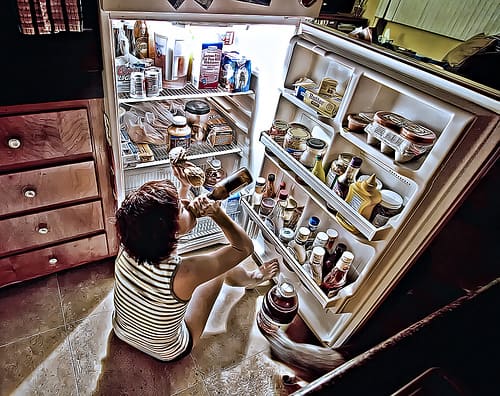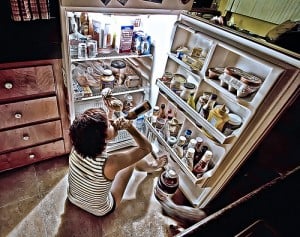
 Binge: a short period devoted to indulging in an activity to excess.
Binge: a short period devoted to indulging in an activity to excess.
One time I had a person tell me she ate “this much broccoli!” as she indicated a cookie sheet size of broccoli. I said, “Any food can be a trigger food if I’m having trigger feelings.” Exasperating she said, “But it’s broccoli!” And I made my hand into a fist and said, “But your stomach is this big.” She said “But it’s broccoli!” and I held out my fist and we did this dance back and forth.
She walked away frustrated at me.
Three months later she approached me and said, “I finally get what you meant.”
Traditionally a binge is any low nutrition food which we overeat. We think of binging on pizza, cookies and other assorted goodies for our mouth and our brains. Some people experience binges involving multiple foods, multiple types, consuming thousands of calories in a relatively short period of time. For binge eaters, overeating can be a regular and uncontrollable event.
There is also a real medical phenomenon where people awake in the middle of the night, eating one to three thousand calories. This behavior is included into the diagnosis of Night Eating Syndrome. Some don’t remember doing the binging. They wake up in the morning and see the remains of their eating experience.
This binges are often described as “I couldn’t stop.” Their brains don’t seem to be able to disengage in the behavior until they’ve run out of the food or until they feel ill.
And the overeating community experiences such shame when this behavior occurs.
But I know many people who binge on many things, nothing to do with food. They binge on TV, they binge on texting, they binge on exercise. Binging is a Western problem. It isn’t exclusive to one community, it’s a challenge even for children. Perhaps binging is part of our national display of desperation and loneliness. Perhaps our binging should be discussed and revealed as deep grief, deep lack of feeling seen, heard and held.
“We are all wonderful, beautiful wrecks. That’s what connects us–that we’re all broken, all beautifully imperfect.” ― Emilio Estevez
The other night I was in quite a bit of emotional pain. I was also really hungry. I kept thinking that I should eat as my pangs were getting worse. But I refused to get something to eat. The pain of my hunger was actually better than feeling the pain of my grief. And it was completely understandable to me in that moment, how disorders of any kind happen. It was preferable to be in pain with one feeling-hunger-than feel my feelings. In any moment, it can feel preferable to binge, overeat, or to go the other way, to starve, to not feel how very difficult it is to walk through this human experience.
But binges, whether socially acceptable or not, is still a binge. It’s still an escape and a way to not be with my self in the very human experience. But the binges don’t work. They actually steal us away from our passion. They steal us away from our heart and they steal us away from the ability to heal our grief.
“Imperfections are not inadequacies; they are reminders that we’re all in this together.” ― Brené Brown
Next time you experience a binge, what do you do next? The most important action is the one that lets you recover. And you must recover. No matter how many glitches your brain has experienced, you must recover.
Reach out to someone. Tell someone who understands. Get to a meeting. Read. Drink a tall glass of water. Take a good walk. Ride a bike. Make a hearty soup. Do something that puts your brain back on line. And slowly, as we deal directly with our sense of loss and dissatisfaction-our grief-perhaps we can let go of attachments to what we don’t have and what we have lost, and we can finally breathe.


Hi Amy,
Thank you for this. Understanding helps with the healing and certainly dealing with the behavior of binging.
L.A.